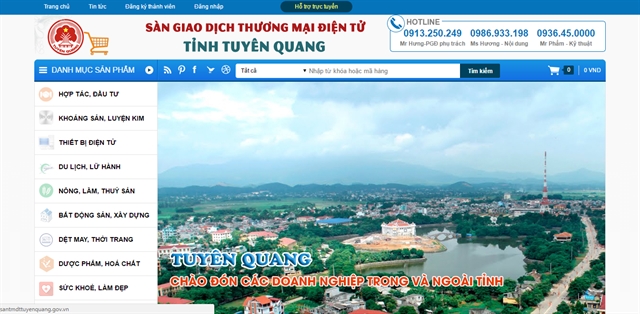The Ministry of Finance is building a draft scheme on the management of e-commerce activities for imports and exports.

The Ministry of Finance is building a draft scheme on the management of e-commerce activities for imports and exports.
The draft aims to improve State agencies’ efficiency in control of e-commerce activities to stop tax evasion, violations of regulations on commodities, intellectual property and origin, and transporting banned goods to Viet Nam and vice versa.
It also offers solutions to develop Viet Nam’s e-commerce activities, such as simplifying customs and specialised inspection procedures, aiming to protect the interests of manufacturers, traders and consumers.
However, due to limited human resources, time and funding, the draft focuses on solutions to control and facilitate trading on e-commerce trading floors or websites. The project does not cover sales on applications such as Zalo and Facebook.
Subjects of this plan include State management agencies related to e-commerce activities such as customs, tax, specialised management and e-commerce management agencies; buyers (organisations and individuals); salespeople; owners of e-commerce trading floors; enterprises transporting export and import goods; enterprises that are agents for e-commerce trading floors; e-commerce websites selling goods and services; and enterprises that are agents implementing customs clearance, reported ictnews.vn.
According to a report by Google and Singaporean investment management firm Temasek, the size of the Vietnamese e-commerce market will increase by 5.3 times in the next seven years from US$2.8 billion in 2018 to $15 billion in 2025.
Meanwhile, the Viet Nam E-commerce Association’s report on Vietnam E-commerce Index (EBI) in 2017-19 said the average annual growth rate of Viet Nam’s e-commerce market is from 25 per cent to 30 per cent.
If Viet Nam maintains this growth rate, the market size in 2025 will be ranked third in Southeast Asia, after Indonesia and Thailand.
Currently, Viet Nam has e-commerce platforms such as Lazada, Tiki, Shopee, Sendo, Adayroi and the growth rate of these sites is very high, with cross-border e-commerce activities increasing rapidly.
Therefore, management agencies need to change their approach to help develop the market.
E-commerce activities in Viet Nam are under the management of the Ministry of Industry and Trade and the Ministry of Finance. The Ministry of Industry and Trade manages licensing for e-commerce trading floors while the Ministry of Finance manages import and export taxes and control import and export goods via e-commerce platforms.
The scheme on management of e-commerce activities for import and export goods is under a programme to promote the National Single Window and ASEAN Single Window, reform the specialised inspection of import and export goods and facilitate trade activities in 2018-20. — VNS





